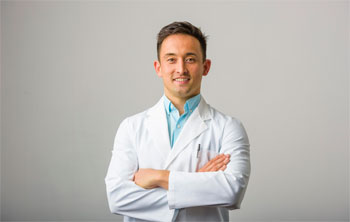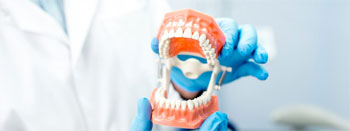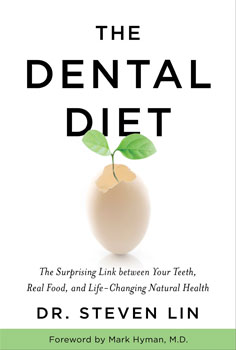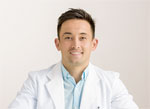Dr. Steven Lin Your Smile Can Save Your Life Interview

Nutritionist Reveals Surprising Signs of Disease
If you want to prevent serious health problems, the first step is checking your mouth. According to Dr. Steven Lin, a world-renowned Australian dental nutritionist, the first signs of underlying illness are in your mouth.
"Tooth problems signal that your body is suffering from a deeper disorder, like heart disease, diabetes, and Alzheimer's," says Dr. Lin, author of The Dental Diet. "Learn the signs and make the right changes, and your smile will reveal great oral and overall health."
Interview with Dr. Steven Lin
Dr. Steven Lin, author of The Dental Diet, is a board-accredited dentist, passionate health educator, and TedX speaker. As the world's first dental nutritionist, Dr. Lin is on a mission to prevent dental diseases, instead of simply treating them, by focusing on the link between nutrition and dental health.
 Question: How do our teeth and gums show evidence of serious health problems?
Question: How do our teeth and gums show evidence of serious health problems?
Dr. Steven Lin: Problems in the mouth signal processes that occur throughout the body. For example, bleeding gums are a sign of inflammation that relate to the gut (where 80% of the immune system lies). If the mouth is inflamed, so is the gut. Conditions with the digestive system are now linked to your weight, chronic digestive issues, immune diseases, metabolic syndromes, and even the brain.
When the mouth shows signs of imbalance, such as bleeding gums, it could be one of the earliest signs you're at risk of a host of other conditions.
Question: What types of signs, in our mouth, should we be aware of as signs of underlying illnesses?
Dr. Steven Lin: Issues like white patches on the inner cheek and tongue could be a sign of oral lichen planus, an auto-immune condition that begins in the gut.
Mouth ulcers may show signs of digestive issues or immune problems.
Question: What do crooked teeth and decay tell us about our health?
Dr. Steven Lin: Crooked teeth mean your jaws haven't grown enough to fit them in. By definition it means your airways are also deprived of space.
When the skeletal system and airway aren't developed it can link to postural problems, sleep disorders, and conditions like teeth grinding that indicate an underlying breathing issue.
Question: What types of food are best for mouth and all over health?
Dr. Steven Lin: The key to strong teeth and healthy gums are eating enough of the fat soluble vitamins A, D, and K2. These are found in well sourced animal products in their most active forms. Think whole eggs, butter, and fatty cuts of meat for good sources of these foods.
 Question: How long after eating should we wait until brushing our teeth?
Question: How long after eating should we wait until brushing our teeth? Dr. Steven Lin: At least 30 minutes, eating can trigger a decrease in saliva pH which may cause enamel erosion if you brush too soon.
Question: Why did you decide to write The Dental Diet?
Dr. Steven Lin: I was finding that my patients asked me more and more questions about their teeth and health that I didn't have the answers for.
It began to bother me and I wondered if I could practice as a dentist for my whole life, just fixing sick mouths.
I took some time away from work to ponder my life and ended up in a travellers hostel in Istanbul Turkey, where a shared reading shelf was.
A boon by the name -Nutrition and Physical Degeneration' by Weston A Price caught my eye. It's a fascinating book about a dentist's world-wide journey to find the cause of dental problems, which he believed began with eating the wrong foods.
From there I was thrown into a world of history, science, and the realisation that our mouths are cardinal signs for what we should be eating.
Question: Can you tell us about what's included in The Dental Diet?
Dr. Steven Lin: Whole, well-sourced foods that feed the oral micro-biome and nourish your bones and teeth with fat soluble vitamins.
These include: egg yolks, whole fat butter and cheese, organ meats, probiotic fermented foods and plenty of fresh and varied vegetables.
 Question: Are you able to share a recipe from The Dental Diet, with us?
Question: Are you able to share a recipe from The Dental Diet, with us? Dr. Steven Lin: Red Butter Roast Beef
Ingredients
1.5 kg topside of beef
2 medium onions
1 whole broccoli
1 bulb of garlic
4 tablespoons of butter
1 tablespoon of paprika
1 table spoon of cayenne pepper
3 tablespoons of sea salt
1 bunch of fresh thyme
Method
Preheat oven 475 degrees.
Heat butter in microwave until melted
Cut and place broccoli, garlic, carrots and thyme into the middle of a large roasting tray.
Combine left over butter with salt, cayenne and paprika
Drizzle beef with red butter and place on vegetables
Turn oven down to 400 degrees and place tray in. Every 20 minutes re-glaze the beef and vegetables to prevent drying. Cook for 60 minutes for medium. For medium rare take out 10-15 minutes earlier. For well-done 10-15 minutes more.
Place any left overs in the fridge for snacks or a savory breakfast
Question: Is it possible to prevent the need for braces? If so, how?
Dr. Steven Lin: Parents can pick up the early signs of dental growth in kids. The first step is to feed them nourishing foods teeth, bones and a healthy gut. Then oral function such as tongue and lip ties, mouth breathing, allergies, swollen tonsils, and head posture can tell us if they are functioning for wide, healthy jaws that house straight teeth.
Interview by Brooke Hunter
Have You Seen This?
MORE




